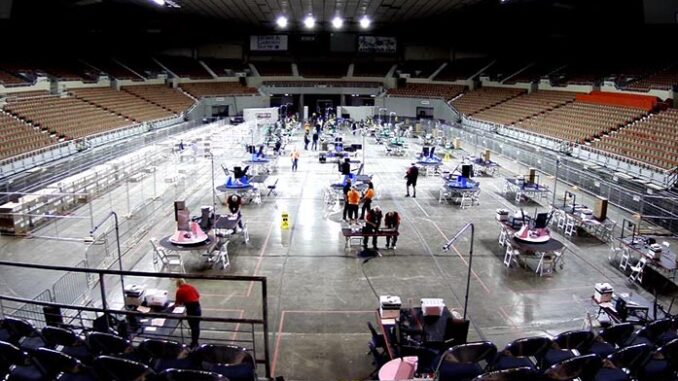
After remaining out of the headlines for a few weeks, the Arizona Senate’s audit of how Maricopa County handled the 2020 General Election is making news, again.
There are the legal challenges involving audit-related public records. There is the assertion that the audit contractor, Florida-based Cyber Ninjas Inc., has not been fully paid.
And there is the pending question of what might be discovered from Maricopa County’s routers, particularly about a cyberattack of voter information being investigated by the FBI.
The Routers
One of the most debated audit activities is just beginning, according to Senate President Karen Fann. It involves the Senate’s desire to determine if any voting system machines were ever connected to the internet, and what online activity took place.
Fann signed two subpoenas which demanded access to the routers, which in return prompted heated public comments from Maricopa County Sheriff Paul Penzone, who stated a review of the routers would put highly confidential law enforcement data at risk of public release.
What Penzone failed to mention in his comments is that the FBI was notified of a cyber security incursion of the Maricopa County Recorder’s Office while early voting was occurring during the 2020 General Election.
It took several months but a settlement reached between Fann and the county board of supervisors could finally bring the activity to a close in early 2022. Under that settlement, Maricopa County officials will allow former Congressman John Shadegg to serve as a special master with a team of IT experts to ask questions on behalf of the Senate.
According to Fann, those questions had been prepared as of mid-December. Now she is waiting for Shadegg to finalize his IT team so the county’s answers can be secured and reviewed.
Fann (R-LD1) also told Arizona Daily Independent that Shadegg is “very anxious” to get the router assignment completed. And Shadegg “understands the importance of election integrity to our voters,” Fann added.
Shadegg’s efforts are being paid by the Senate.
The Money
Meanwhile, Fann is still being kept busy with several other audit-related issues. One involves Cyber Ninjas, which she contracted with to conduct the majority of the audit activities involving the 2.1 million ballots cast for the 2020 General Election.
Doug Logan, Cyber Ninjas’ president, has admitted his company received in excess of $6 million in private funds to help cover the costs of the audit. That was on top of the $150,000 which Fann committed the Arizona Senate to paying.
The company is continuing to incur unexpected costs three months after Logan took part in a public presentation of his company’s report to the Senate. And according to one of Cyber Ninjas’ attorneys, they have not received the final $100,000 from the Senate.
Fann acknowledges the company is owed the money, but believes final payment should not be made until the outstanding router questions are resolved.
The Public Records
Some of the unexpected costs Cyber Ninjas is incurring are connected to two civil lawsuits filed against the Senate under Arizona’s public records law. The company was even recently added as a party to one of the cases despite its objection.
One of the cases was filed by an Arizona media outlet while the other was initiated by American Oversight, which describes itself as a nonpartisan, nonprofit watchdog that uses public records requests to drive accountability. Both seek to force the release of records about the Senate’s audit which happen to be in the control of Cyber Ninjas.
A Maricopa County judge has ruled, and the Arizona Court of Appeals has affirmed, that myriad documents in the company’s possession “have a substantial nexus to the audit” and are thus public records which must be disclosed under state law. But Cyber Ninjas has argued it is a private company and therefore exempt from any public records statutes.
For now, Logan is scheduled to take part in a videotaped deposition on Jan. 5 concerning the public record dispute. Statements which Logan makes during the deposition, which is done under oath, can be used as evidence as the public records cases move forward.
Wilenchik, the company’s audit-related attorney, has stated that Cyber Ninjas cannot afford to comply with current court orders which demand thousands of pages of documents be redacted and then released to the plaintiffs. Another court hearing is expected once Logan’s deposition is complete.
County’s Comments
Despite what might be happening in the court of law, there appears to be no end between the Senate and Maricopa County to the war of words in the court of public opinion.
The county’s social media accounts, which are run by paid employees and not elected officials, have repeatedly discredited the audit, Cyber Ninjas and their subcontractors, and more recently Fann herself.
Yet despite efforts by Maricopa County to ignore any question raised by the Senate’s audit about how certain aspects of the 2020 General Election was conducted, the Jan. 10 opening of the new legislative session may put an end to that.
Several state lawmakers are looking forward to holding hearings about county’s election procedures. This would force county elections personnel to answer questions in a public setting.
The possibility of such public hearings took a big leap forward when Fann named Sen. Kelly Townsend (R-LD16) as the new chair of the Senate’s Committee on Government. Townsend is expected to introduce several key election-reform and election-integrity bills. The committee’s vice-president, Sen. Sonny Borrelli (R-LD5), is a strong audit supporter.
